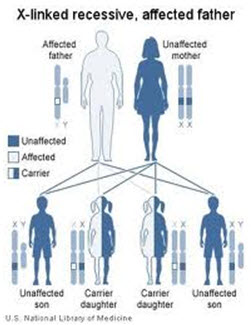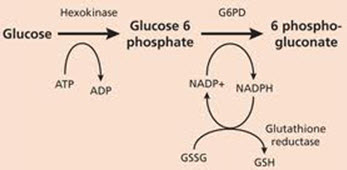Mehndi MadnessTM Blog
 Krysteen
KrysteenCan someone have a reaction to using henna?
Only if they have a very rare G6PD deficiency, a low enzyme level that causes severe anemia. It’s extremely rare to have this deficiency and more than likely, if you have it, you know because you’d already have had a reaction to certain drugs, foods or chemicals. Also, it’s hereditary, so others in your family will have known about it.
Glucose-6-Phosphate dehydrogenase deficiency
 Glucose-6-Phosphate dehydrogenase deficiency or G6PD for short is an x-linked recessive hereditary disease. People with the disease have low levels of the enzyme which helps red blood cell metabolisms. They have reactions with many things, certain foods, drugs, chemicals and other substances including henna. Anyone with this enzyme deficiency should not have henna put on them, as it can cause severe anemia. Often people with the disease have prolonged pre-natal jaundice and fragile skin especially when young.
Glucose-6-Phosphate dehydrogenase deficiency or G6PD for short is an x-linked recessive hereditary disease. People with the disease have low levels of the enzyme which helps red blood cell metabolisms. They have reactions with many things, certain foods, drugs, chemicals and other substances including henna. Anyone with this enzyme deficiency should not have henna put on them, as it can cause severe anemia. Often people with the disease have prolonged pre-natal jaundice and fragile skin especially when young.
Since it is an x-linked inheritable trait most cases are found in men. If the trait is on at least one X chromosome, a male will have the disease, however a female would need to have it on both X chromosomes, which in turn, about twice as many males will have the deficiency.
Henna contains Lawsone, a red tannin dye that oxidizes with G6PD cells and can be dangerous for people with the disease. Although most infants, especially in Middle Eastern countries, are screened for the deficiency, it is always good to ask. If they are not sure if they have the disease, ask them if their doctor has ever cautioned them against using: aspirin, non-steroidal anti-inflammatory drugs, fava beans, quinine, naphthalene fumes or mothballs.
 Most people or families should know if they carry the trait. Infants and toddlers should be advised not to have henna, unless known for sure they do not carry the disease. In many Middle Eastern and North African countries, where henna is popular, mothers like to henna infants aged 1-2 months or young children for celebrations or holidays, but for G6PD people, it can cause them to become lethargic and jaundiced within 24 hours which requires blood transfusions. Although Henna is great for celebrations, it can be dangerous for someone that has G6PD.
Most people or families should know if they carry the trait. Infants and toddlers should be advised not to have henna, unless known for sure they do not carry the disease. In many Middle Eastern and North African countries, where henna is popular, mothers like to henna infants aged 1-2 months or young children for celebrations or holidays, but for G6PD people, it can cause them to become lethargic and jaundiced within 24 hours which requires blood transfusions. Although Henna is great for celebrations, it can be dangerous for someone that has G6PD.
The easiest way for G6PD patients to avoid symptoms is prevention from all foods or drugs that cause the reaction. In the first stages, blood transfusions or dialysis might prevent severe reactions and people can live a normal lifespan.
